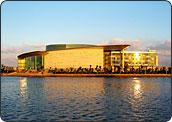
Ningbo is located on the East China Sea, in the middle of China's coastline, and at the southern flank of the Yangtze River Delta. It is the birthplace of the ‘Hemudu Culture'dating back 7,000 years. Since the Tang & Song Dynasties(618-1279), Ningbo has always been an important foreign trading port in China. Today, Ningbo is a city with the same rights as a province in economic planning and management, a sub-provincial-level city further opening up to the rest of the world, and a “fairly large city” entitled to formulate local laws and regulations.
It is also a famous historic city with a rich cultural heritage. Under its jurisdiction are 3 counties, 3 county-level cities and 5 urban districts. It covers a total area of 9,365 sq.km., including the 1,033-sq.km. city proper; and has a population of 5.38 million, 1.22 million of whom live in the urban area. Since the implementation of reform and opening-up policies, Ningbo has witnessed rapid economic and social development. In 2000, Ningbo's GDP reached 119.2 billion yuan. Its revenue income reached 14.8 billion yuan. The export volume of Ningbo's local companies reached US$5,168 million. The annual per capita disposable income of urban dwellers averaged 10,921 yuan.The annual average per capita net income of rural residents reached 5,096 yuan. Ningbo ranked 27th among 219 Chinese cities that are of or above prefecture level. In terms of its overall strength, Ningbo is one of the 50 top Chinese cities and is listed as one of the 40 best cities for its investment environment. Ningbo has built a solid foundation and enjoys favorable conditions for its further development. Ningbo Beilun Port is one of 4 international deep-water transshipment ports on Mainland China. Its throughput of cargo reached 115.47 million tons and the containers, over 900,000 TEU in 2000. Ningbo has not only maintained its traditional industries such as garment, textile and machinery, but also developed large-scale port industries such as petrochemicals, iron & steel, electricity and paper-making industries.Ningbo Ec onomic & Technical Development Zone, Daxie Island Development Zone and Ningbo Free Trade Zone, all at the state-level, are being operated in accordance with international practices. In 1998, Ningbo was among the first batch of cities to be honored as One of China's Excellent Tourism Cities open to public. Over 300,000 people of Ningbo origin and their offspring reside in 64 countries and regions.Ningbo has gradually become a regional centre at the southern flank of the Yangtze River Delta and an important trading port in East China. A modern international port city is to be positioned on the East China Sea. In the course of new century, the diligent and intelligent people of Ningbo, with innovative and pioneering spirits, will restore its former glory.
 Steady progress was made in agriculture. The total output value of the primary industry was 14,840 million yuan, up 5.3% over the previous year. Remarkable progress has been made in the adjustment of agricultural structure.The cultivated area of traditional crop decreased more ,down 20.1%,and that of cotton decreased by near third. At the same time,all kinds of economic corn such as vegetables,fruits,medicinal materials have been rapidly developed. The cultivated area of this kind of crop increased 509,000 mu.Steady progress was made in fishery,and the marine cultivated area increased 177,300 mu.The production of aquatic products reached 816,200 ton. The conditions for agricultural production have continuously improved. The mechanization of agriculture continued to be upgraded.In this year, an investment of 1.95 billion yuan was made to improve agriculture, forestry, animal husbandry,fisheries and water conservancy facilities.The construction of 280km of a planned standard seawall has been completed. The total mechanical power of agriculture reached 1,900,000 kw,up 1.6% over the previous year.
Steady progress was made in agriculture. The total output value of the primary industry was 14,840 million yuan, up 5.3% over the previous year. Remarkable progress has been made in the adjustment of agricultural structure.The cultivated area of traditional crop decreased more ,down 20.1%,and that of cotton decreased by near third. At the same time,all kinds of economic corn such as vegetables,fruits,medicinal materials have been rapidly developed. The cultivated area of this kind of crop increased 509,000 mu.Steady progress was made in fishery,and the marine cultivated area increased 177,300 mu.The production of aquatic products reached 816,200 ton. The conditions for agricultural production have continuously improved. The mechanization of agriculture continued to be upgraded.In this year, an investment of 1.95 billion yuan was made to improve agriculture, forestry, animal husbandry,fisheries and water conservancy facilities.The construction of 280km of a planned standard seawall has been completed. The total mechanical power of agriculture reached 1,900,000 kw,up 1.6% over the previous year.




